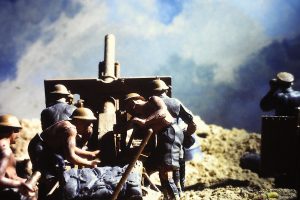Since the Internet exploded by the massive amount of requests sent to me [maybe not so much or ‘zero’ counts as such] herewith, in instalments, just some loose ends, parts, of Carl von Clausewitz’ Vom Kriege…
This time, a somewhat longer section but an important one for all in business, or in the business of organisation organisation; hence presented in parallel columns [pending cooperation of the browser et al.] yes it’s quite a longread but there will be a picture at the end when you get through all this:
“
Siebentes Kapitel: Friktion im Kriege
Solange man selbst den Krieg nicht kennt, begreift man nicht, wo die Schwierigkeiten der Sache liegen, von denen immer die Rede ist, und was eigentlich das Genie und die außerordentlichen Geisteskräfte zu tun haben, die vom Feldherrn gefordert werden. Alles erscheint so einfach, alle erforderlichen Kenntnisse erscheinen so flach, alle Kombinationen so unbedeutend, daß in Vergleichung damit uns die einfachste Aufgabe der höheren Mathematik mit einer gewissen wissenschaftlichen Würde imponiert. Wenn man aber den Krieg gesehen hat, wird alles begreiflich, und doch ist es äußerst schwer, dasjenige zu beschreiben, was diese Veränderung hervorbringt, diesen unsichtbaren und überall wirksamen Faktor zu nennen.Es ist alles im Kriege sehr einfach, aber das Einfachste ist schwierig. Diese Schwierigkeiten häufen sich und bringen eine Friktion hervor, die sich niemand richtig vorstellt, der den Krieg nicht gesehen hat. Man denke sich einen Reisenden, der zwei Stationen am Ende seiner Tagereise noch gegen Abend zurückzulegen denkt, vier bis fünf Stunden mit Postpferden auf der Chaussee; es ist nichts. Nun kommt er auf der vorletzten Station an, findet keine oder schlechte Pferde, dann eine bergige Gegend, verdorbene Wege, es wird finstere Nacht, und er ist froh, die nächste Station nach vielen Mühseligkeiten erreicht zu haben und eine dürftige Unterkunft dort zu finden. So stimmt sich im Kriege durch den Einfluß unzähliger kleiner Umstände, die auf dem Papier nie gehörig in Betrachtung kommen können, alles herab, und man bleibt weit hinter dem Ziel. Ein mächtiger eiserner Wille überwindet diese Friktion, er zermalmt die Hindernisse, aber freilich die Maschine mit. Wir werden noch oft auf das Resultat kommen. Wie ein Obelisk, auf den die Hauptstraßen eines Ortes zugeführt sind, steht in der Mitte der Kriegskunst gebieterisch hervorragend der feste Wille eines stolzen Geistes.
Friktion ist der einzige Begriff, welcher dem ziemlich allgemein entspricht, was den wirklichen Krieg von dem auf dem Papier unterscheidet. Die militärische Maschine, die Armee und alles, was dazu gehört, ist im Grunde sehr einfach und scheint deswegen leicht zu handhaben. Aber man bedenke, daß kein Teil davon aus einem Stücke ist, daß alles aus Individuen zusammengesetzt ist, deren jedes seine eigene Friktion nach allen Seiten hin behält. Theoretisch klingt es ganz gut: der Chef des Bataillons ist verantwortlich für die Ausführung des gegebenen Befehls, und da das Bataillon durch die Disziplin zu einem Stück zusammengeleimt ist, der Chef aber ein Mann von anerkanntem Eifer sein muß, so dreht sich der Balken um einen eisernen Zapfen mit wenig Friktion. So aber ist es in der Wirklichkeit nicht, und alles, was die Vorstellung Übertriebenes und Unwahres hat, zeigt sich im Kriege auf der Stelle. Das Bataillon bleibt immer aus einer Anzahl Menschen zusammengesetzt, von denen, wenn der Zufall es will, der unbedeutendste imstande ist, einen Aufenthalt oder sonst eine Unregelmäßigkeit zu bewirken. Die Gefahren, welche der Krieg mit sich bringt, die körperlichen Anstrengungen, die er fordert, steigern das Übel so sehr, daß sie als die beträchtlichsten Ursachen desselben angesehen werden müssen.
Diese entsetzliche Friktion, die sich nicht wie in der Mechanik auf wenig Punkte konzentrieren läßt, ist deswegen überall im Kontakt mit dem Zufall und bringt dann Erscheinungen hervor, die sich gar nicht berechnen lassen, eben weil sie zum großen Teil dem Zufall angehören. Ein solcher Zufall ist z. B. das Wetter. Hier verhindert der Nebel, daß der Feind zu gehöriger Zeit entdeckt wird, daß ein Geschütz zur rechten Zeit schießt, daß eine Meldung den kommandierenden Offizier findet; dort der Regen, daß ein Bataillon ankommt, daß ein anderes zur rechten Zeit kommt, weil es statt drei vielleicht acht Stunden marschieren mußte, daß die Kavallerie wirksam einhauen kann, weil sie im tiefen Boden steckenbleibt usw.
Diese paar Detailzüge nur zur Deutlichkeit, und damit Verfasser und Leser zusammen bei der Sache bleiben, denn sonst ließen sich von solchen Schwierigkeiten ganze Bände voll schreiben. Um dies zu vermeiden und doch einen deutlichen Begriff von dem Heere kleiner Schwierigkeiten hervorzubringen, womit man im Kriege kämpft, möchten wir uns in Bildern erschöpfen, wenn wir nicht zu ermüden befürchteten. Aber ein paar werden uns auch diejenigen noch zugute halten, die uns längst verstanden haben.
Das Handeln im Kriege ist eine Bewegung im erschwerenden Mittel. Sowenig man imstande ist, im Wasser die natürlichste und einfachste Bewegung, das bloße Gehen, mit Leichtigkeit und Präzision zu tun, sowenig kann man im Kriege mit gewöhnlichen Kräften auch nur die Linie des Mittelmäßigen halten. Daher kommt es, daß der richtige Theoretiker wie ein Schwimmeister erscheint, der Bewegungen, die fürs Wasser nötig sind, auf dem Trocknen üben läßt, die denen grotesk und übertrieben vorkommen, die nicht an das Wasser denken; daher kommt es aber auch, daß Theoretiker, die selbst nie untergetaucht haben oder von ihren Erfahrungen nichts Allgemeines zu abstrahieren wissen, unpraktisch und selbst abgeschmackt sind, weil sie nur das lehren, was ein jeder kann – gehen.
Ferner: jeder Krieg ist reich an individuellen Erscheinungen, mithin ist jeder ein unbefahrenes Meer voll Klippen, die der Geist des Feldherrn ahnen kann, die aber sein Auge nie gesehen hat, und die er nun in dunkler Nacht umschiffen soll. Erhebt sich noch ein widriger Wind, d. h. erklärt sich noch irgendein großer Zufall gegen ihn, so ist die höchste Kunst, Geistesgegenwart und Anstrengung da nötig, wo dem Entfernten alles von selbst zu gehen scheint. Die Kenntnis dieser Friktion ist ein Hauptteil der oft gerühmten Kriegserfahrung, welche von einem guten General gefordert wird. Freilich ist der nicht der beste, der die größte Vorstellung davon hat, dem sie am meisten imponiert (dies gibt jene Klasse von ängstlichen Generalen, die unter den Erfahrenen so häufig zu finden sind), sondern der General muß sie kennen, um sie zu überwinden, wo dies möglich ist, und um nicht eine Präzision in den Wirkungen zu erwarten, die eben wegen dieser Friktion nicht möglich ist. – Man wird sie übrigens theoretisch nie ganz kennenlernen, und könnte man es, so würde jene Übung des Urteils immer noch fehlen, die man Takt nennt, und die allemal in einem Felde voll unendlich kleiner und mannigfaltiger Gegenstände nötiger ist als in großen entscheidenden Fällen, wo man mit sich und anderen Konzilium hält. So wie den Weltmann nur der fast zur Gewohnheit gewordene Takt seines Urteils immer passend sprechen, handeln und sich bewegen läßt, so wird nur der kriegserfahrene Offizier bei großen und kleinen Vorfällen, man möchte sagen bei jedem Pulsschlage des Krieges, immer passend entscheiden und bestimmen. Durch diese Erfahrung und Übung kommt ihm der Gedanke von selbst: das eine geht, das andere nicht. Er wird also nicht leicht in den Fall kommen, sich eine Blöße zu geben, was im Kriege, wenn es häufig geschieht, die Grundfeste des Vertrauens erschüttert und äußerst gefährlich ist.
Die Friktion, oder was hier so genannt ist, ist es also, welche das scheinbar Leichte schwer macht. Wir werden in der Folge noch oft auf diesen Gegenstand zurückkommen, und es wird dann auch klar werden, daß außer Erfahrung und einem starken Willen noch manche andere seltene Eigenschaften des Geistes zum ausgezeichneten Feldherrn erforderlich sind.”
“
Friction in War
As long as we have no personal knowledge of war, we cannot conceive where those difficulties lie of which so much is said, and what that genius, and those extraordinary mental powers required in a general have really to do. All appears so simple, all the requisite branches of knowledge appear so plain, all the combinations so unimportant, that, in comparison with them, the easiest problem in higher mathematics impresses us with a certain scientific dignity. But if we have seen war, all becomes intelligible; and still, after all, it is extremely difficult to describe what it is which brings about this change, to specify this invisible and completely efficient Factor.Everything is very simple in war, but the simplest thing is difficult. These difficulties accumulate and produce a friction, which no man can imagine exactly who has not seen war. Suppose now a traveller, who, towards evening, expects to accomplish the two stages at the end of his day’s journey, four or five leagues, with post horses, on the high road—it is nothing. He arrives now at the last station but one, finds no horses, or very bad ones; then a hilly country, bad roads; it is a dark night, and he is glad when, after a great deal of trouble, he reaches the next station, and finds there some miserable accommodation. So in war, through the influence of an infinity of petty circumstances, which cannot properly be described on paper, things disappoint us, and we fall short of the mark. A powerful iron will overcomes this friction, it crushes the obstacles, but certainly the machine along with them. We shall often meet with this result. Like an obelisk, towards which the principal streets of a place converge, the strong will of a proud spirit, stands prominent and commanding, in the middle of the art of war.
Friction is the only conception which, in a general way, corresponds to that which distinguishes real war from war on paper. The military machine, the army and all belonging to it, is in fact simple; and appears, on this account, easy to manage. But let us reflect that no part of it is in one piece, that it is composed entirely of individuals, each of which keeps up its own friction in all directions. Theoretically all sounds very well; the commander of a battalion is responsible for the execution of the order given; and as the battalion by its discipline is glued together into one piece, and the chief must be a man of acknowledged zeal, the beam turns on an iron pin with little friction. But it is not so in reality, and all that is exaggerated and false in such a conception manifests itself at once in war. The battalion always remains composed of a number of men, of whom, if chance so wills, the most insignificant is able to occasion delay, and even irregularity. The danger which war brings with it, the bodily exertions which it requires, augment this evil so much, that they may be regarded as the greatest causes of it.
This enormous friction, which is not concentrated, as in mechanics, at a few points, is therefore everywhere brought into contact with chance, and thus facts take place upon which it was impossible to calculate, their chief origin being chance, As an instance of one such chance, take the weather. Here, the fog prevents the enemy from being discovered in time, a battery from firing at the right moment, a report from reaching the general; there, the rain prevents a battalion from arriving, another from reaching in right time, because, instead of three, it had to march perhaps eight hours; the cavalry from charging effectively because it is stuck fast in heavy ground.
These are only a few incidents of detail by way of elucidation, that the reader may be able to follow the author, for whole volumes might be written on these difficulties. To avoid this, and still to give a clear conception of the host of small difficulties to be contended with in war, we might go on heaping up illustrations, if we were not afraid of being tiresome. But those who have already comprehended us will permit us to add a few more.
Activity in war is movement in a resistant medium. Just as a man in water is unable to perform with ease and regularity the most natural and simplest movement, that of walking, so in war, with ordinary powers, one cannot keep even the line of mediocrity. This is the reason that the correct theorist is like a swimming master, who teaches on dry land movements which are required in the water, which must appear grotesque and ludicrous to those who forget about the water. This is also why theorists, who have never plunged in themselves, or who cannot deduce any generalities from their experience, are unpractical and even absurd, because they only teach what every one knows—how to walk.
Further, every war is rich in particular facts; while, at the same time, each is an unexplored sea, full of rocks, which the general may have a suspicion of, but which he has never seen with his eye, and round which, moreover, he must steer in the night. If a contrary wind also springs up, that is, if any great accidental event declares itself adverse to him, then the most consummate skill, presence of mind and energy, are required; whilst to those who only look on from a distance, all seems to proceed with the utmost ease. The knowledge of this friction is a chief part of that so often talked of, experience in war, which is required in a good general. Certainly, he is not the best general in whose mind it assumes the greatest dimensions, who is the most overawed by it (this includes that class of over-anxious generals, of whom there are so many amongst the experienced); but a general must be aware of it that he may overcome it, where that is possible; and that he may not expect a degree of precision in results which is impossible on account of this very friction. Besides, it can never be learnt theoretically; and if it could, there would still be wanting that experience of judgment which is called tact, and which is always more necessary in a field full of innumerable small and diversified objects, than in great and decisive cases, when one’s own judgment may be aided by consultation with others. Just as the man of the world, through tact of judgment which has become habit, speaks, acts, and moves only as suits the occasion, so the officer, experienced in war, will always, in great and small matters, at every pulsation of war as we may say, decide and determine suitably to the occasion. Through this experience and practice, the idea comes to his mind of itself, that so and so will not suit. And thus he will not easily place himself in a position by which he is compromised, which, if it often occurs in war, shakes all the foundations of confidence, and becomes extremely dangerous.
It is, therefore, this friction, or what is so termed here, which makes that which appears easy in war difficult in reality. As we proceed, we shall often meet with this subject again, and it will hereafter become plain that, besides experience and a strong will, there are still many other rare qualities of the mind required to make a man a consummate general.”
And there it is:

[Tourism turned into war ..? Barça of course]

























